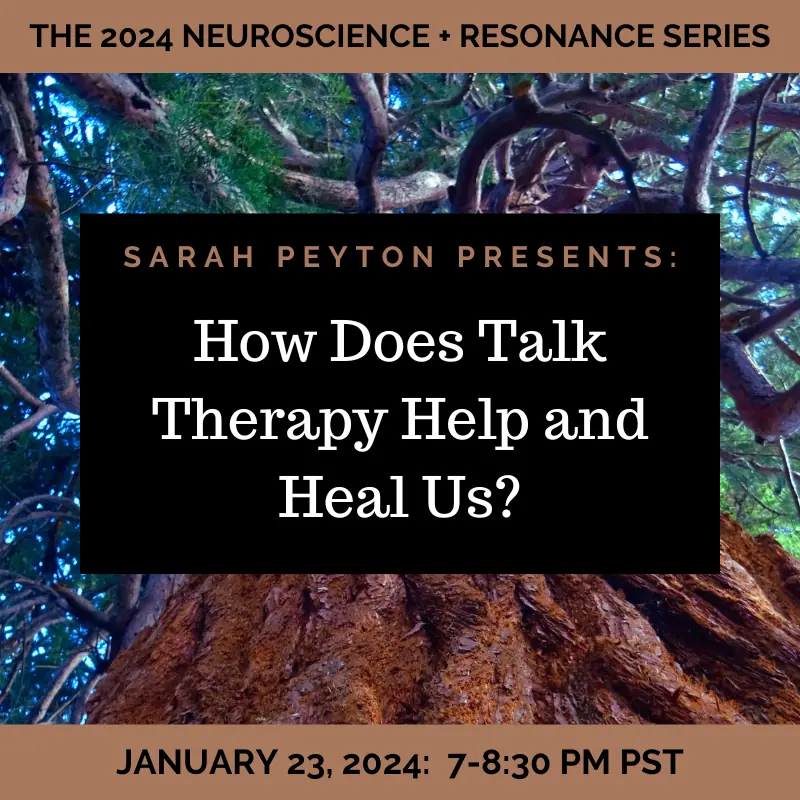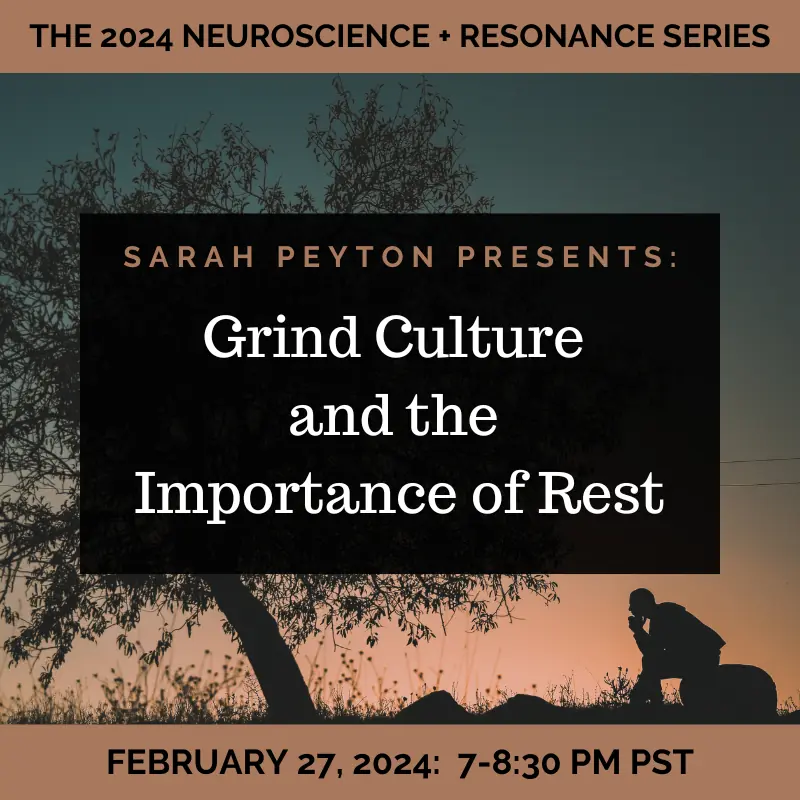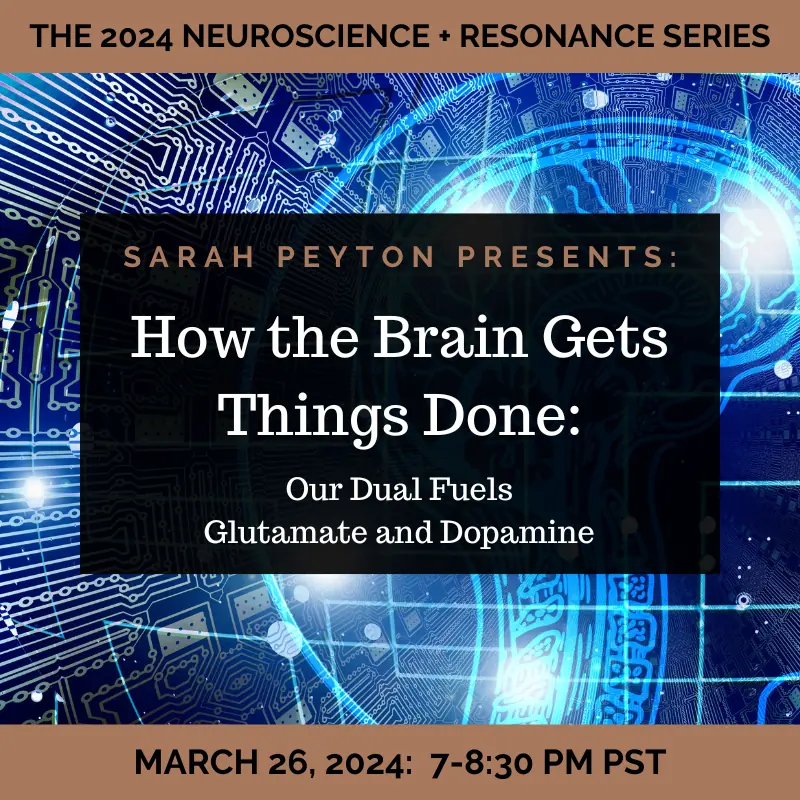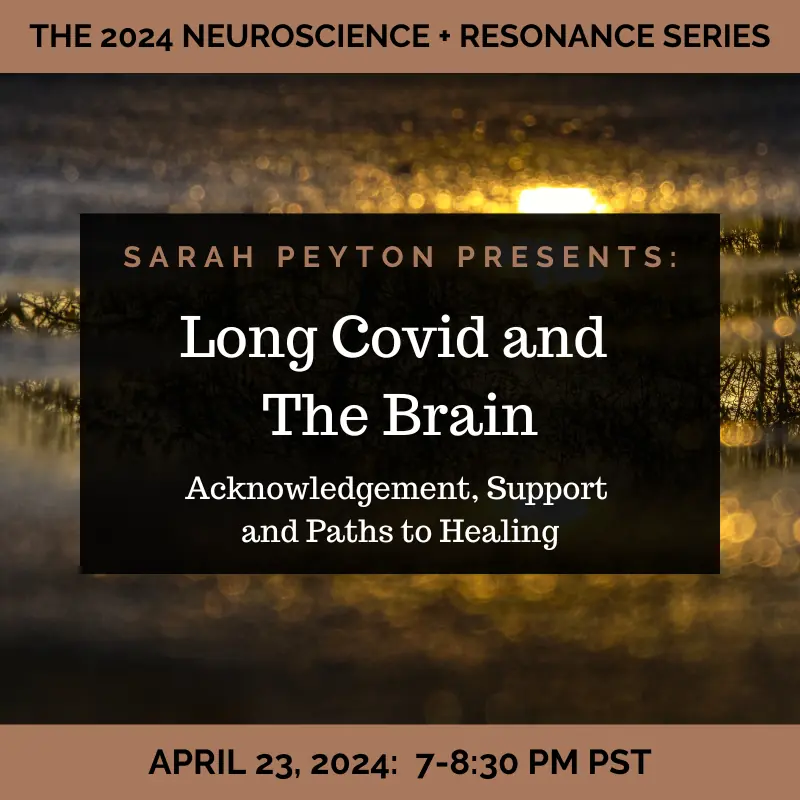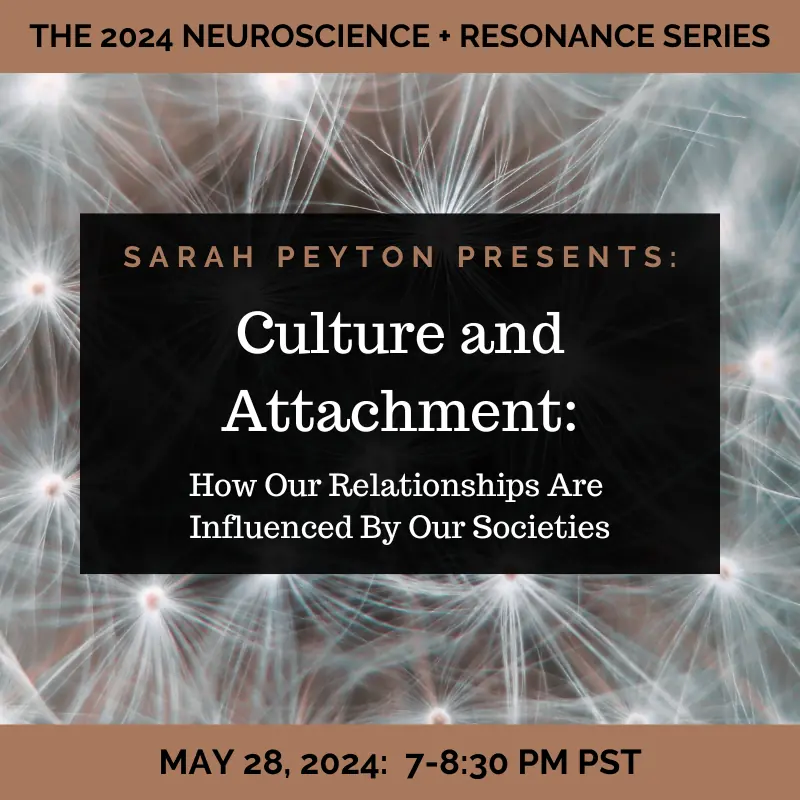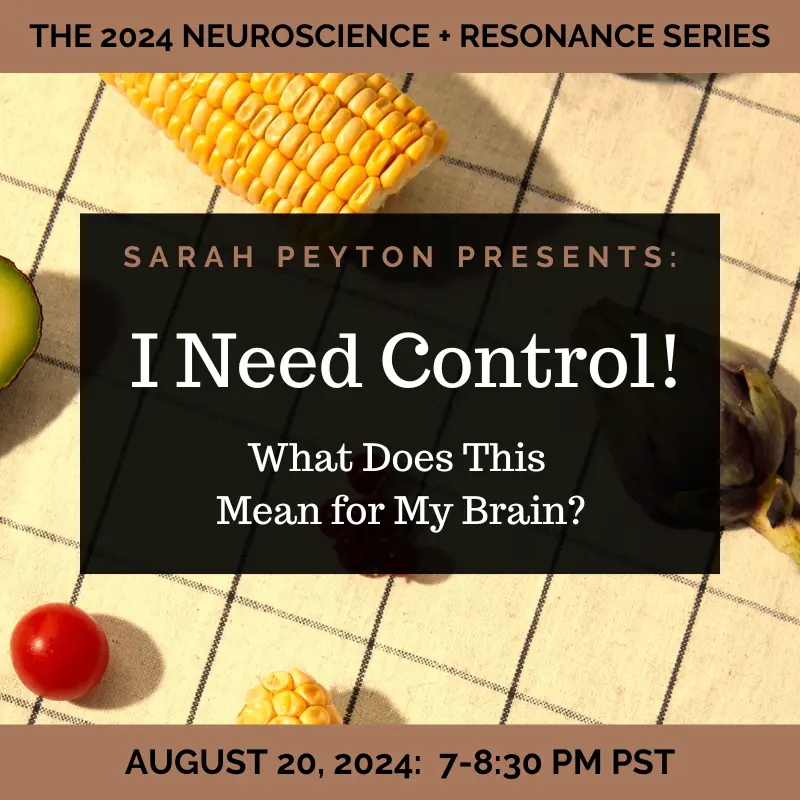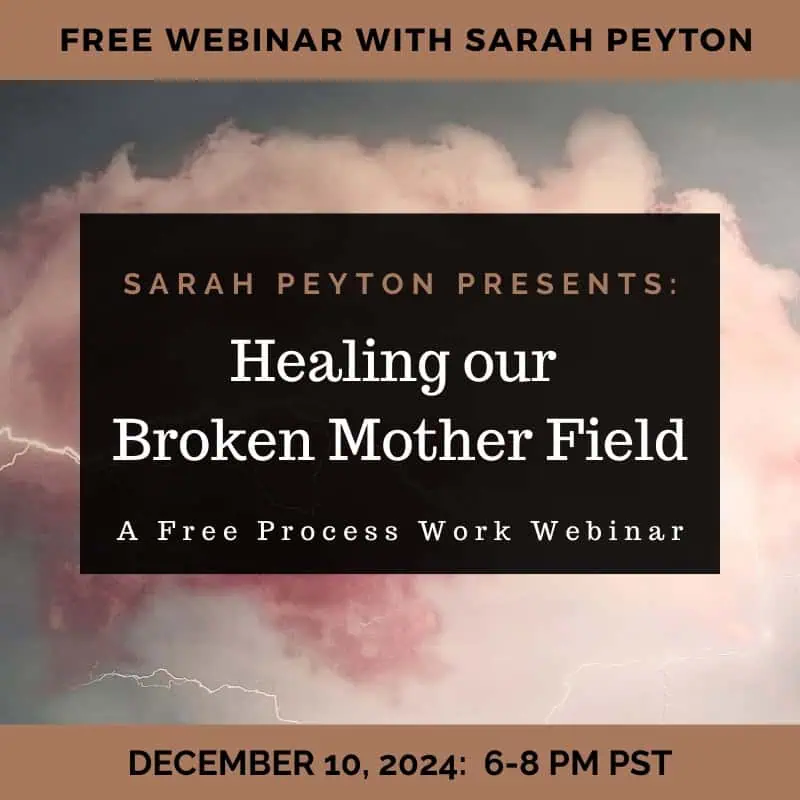The 2024 Neuroscience and Resonance Monthly Series
Each month, Sarah presents a 90-minute deep-dive into the latest neuroscience research on various healing topics, and how we might apply it to resonant healing. Each webinar supports us to see ourselves, and our brains, with compassion and understanding. Purchase individual sessions or the entire series!
January 2024 – December 2024 Topics
(Every 4th Tuesday, from 7-8:30pm Pacific Time)
Please note: these are primarily learning and neuroscience content webinars, including a small number of actionable insights and healing process work. If you are seeking individualized healing and practice opportunities, please see Sarah’s upcoming courses here
How Does Talk Therapy Help and Heal Us?
Did you ever wonder what talk therapy is supposed to do, and what it does? So many of us have spent years in therapy, and how has that changed our brains? How do our therapists become a part of us?
What are the most effective, brain-changing approaches in talk therapy? Does it matter what techniques our therapists use?
In this 90 minute class with Sarah Peyton we will look at research and experience, and look at the possibilities of integrating resonant language into talk therapy.
- This is an online zoom webinar that runs for 90-minutes with an optional 30 min Q&A.
- Purchase includes invitation to the live webinar and post-webinar access to access the recording + slides. The slides include research citations where relevant.
- This webinar is the January meeting of Sarah’s 2024 Neuroscience and Resonance monthly series.
- We are delighted to offer 1.5 CEU hours for psychologists and social workers for this course ($12 additional fee). Details here.
- Live attendance is required to receive CEUs.
Grind Culture and the Importance of Rest
What is “grind culture” and how does it impact us? How are we caught up in fundamentally unsustainable systems for our brains and bodies? What is the impact of a high value on production and labor on our brains? What are we missing?
What are the values and messages that block us from rest in our respective cultures, and is it possible to challenge them? Can we claim gorgeous, life-serving, nourishing relaxation, and increase our capacity for enjoyment? And if so, how can resonance help us?
Join Sarah for this 90-minute webinar to explore the neuroscience of rest and down-time, and look at ways to release the work-focused contracts that can harm us.
- This is an online zoom webinar that runs for 90-minutes with an optional 30 min Q&A.
- Purchase includes invitation to the live webinar and post-webinar access to access the recording + slides. The slides include research citations where relevant.
- This webinar is the February meeting of Sarah’s 2024 Neuroscience and Resonance monthly series
- We are delighted to offer 1.5 CEU hours for psychologists and social workers for this course ($12 additional fee). Details here.
- Live attendance is required to receive CEUs.
How the Brain Gets Things Done: Our Dual-Fuels Glutamate and Dopamine
How does the brain run? Where does it get its energy? Glutamate is involved in so many of our emotions, so how does it work? What is Dopamine’s contribution to our energy levels and our well-being? Can we be undersupplied with glutamate and dopamine? Can we have too much?
How do we balance our brains out? What is their role in addiction? What can we do from a resonance standpoint to have a different experience of our brains? In this 90-minute webinar with Sarah Peyton, we will learn how to accompany our brains with energy and balance.
- This is an online zoom webinar that runs for 90-minutes with an optional 30 min Q&A.
- Purchase includes invitation to the live webinar and post-webinar access to access the recording + slides. The slides include research citations where relevant.
- This webinar is the March meeting of Sarah’s 2024 Neuroscience and Resonance monthly series
- We are delighted to offer 1.5 CEU hours for psychologists and social workers for this course ($12 additional fee). Details here.
- Live attendance is required to receive CEUs.
“I have been a webinar subscriber for 7 years now and these are the BEST webinars in the industry! Sarah translates complex neuroscience concepts into interesting and relevant material, combining research-based knowledge with warmth and compassion. Highly recommended.”
– Olga Nguyen, Certified Trainer with Centre for Nonviolent Communication
Long Covid and the Brain: Acknowledgment, Support and Paths to Healing
Have you been worried or concerned by the list of Long Covid’s effect on the brain?
Scientists are mentioning cognitive decline, including impairments in executive functioning, processing speed, category fluency, memory encoding, and recall. Researchers have seen changes in brain size and structure, depression and suicidal thinking, tremors, seizures, thinking, memory loss and dementia.
That’s quite a lot of consequence to living in this new world where Covid is so common. What are the best approaches to resonance for our beleaguered brains?
This 90-minute class with Sarah Peyton will not address health strategies; instead we will focus on Covid’s impact on brain cells and how to make resonance guesses for ourselves, and on how to clear the path to rest and gentleness.
- This is an online zoom webinar that runs for 90-minutes with an optional 30 min Q&A.
- Purchase includes invitation to the live webinar and post-webinar access to access the recording + slides. The slides include research citations where relevant.
- This webinar is the April meeting of Sarah’s 2024 Neuroscience and Resonance monthly series
- We are delighted to offer 1.5 CEU hours for psychologists and social workers for this course ($12 additional fee). Details here.
- Live attendance is required to receive CEUs.
Culture and Attachment: How Our Relationships Are Influenced by Our Societies
What are the flavors of relationship in your childhood world that persist into adulthood? What do you expect from others? When you move from culture to culture, from class environment to class environment, from country to country, how do you mesh with each?
What are the factors at play in your sense of belonging? How does your worldview change, depending on your lens? The cultural orientation of our world of relationships is cooked in the crockpots of childhood, but if we don’t know what the spices are, it’s hard to talk about what we’re tasting.
Join Sarah Peyton for a 90-minute exploration of research into culture and attachment.
- This is an online zoom webinar that runs for 90-minutes with an optional 30 min Q&A.
- Purchase includes invitation to the live webinar and post-webinar access to access the recording + slides. The slides include research citations where relevant.
- This webinar is the May meeting of Sarah’s 2024 Neuroscience and Resonance monthly series
- We are delighted to offer 1.5 CEU hours for psychologists and social workers for this course ($12 additional fee). Details here.
- Live attendance is required to receive CEUs.
Hooked by Emotion: What is Borderline Personality?
The word “Borderline” gets thrown around a lot as a way for people to blame each other for getting hurt and angry. What does Borderline Personality actually point to in the brain? What things happen that make it more likely for people to be hooked and ruled by their emotions?
How is trust broken among humans, and what are the consequences of broken trust? And if the term “Borderline” actually resonates for us, in terms of the way we respond to things, what are some possible paths to healing?
Join Sarah Peyton to investigate the relational neuroscience of Borderline Personality and to look at resonant approaches to support and transformation.
- This is an online zoom webinar that runs for 90-minutes with an optional 30 min Q&A.
- Purchase includes invitation to the live webinar and post-webinar access to access the recording + slides. The slides include research citations where relevant.
- This webinar is the June meeting of Sarah’s 2024 Neuroscience and Resonance monthly series
- We are delighted to offer 1.5 CEU hours for psychologists and social workers for this course ($12 additional fee). Details here.
- Live attendance is required to receive CEUs.
“Working with Sarah, my body has changed from being a highly reactive one with panic attacks and anxiety into a calm, peaceful and resilient body. Through Sarah Peyton’s work I have learned to listen to my witness self and give kindness to myself in times of challenge. My nervous system has changed as a result of the practices learned from Sarah Peyton. I highly recommend her!”
– Carol Lindsay
It’s Not Fair! Why Brains Love Fairness and Why It’s Important
Have you ever noticed that your whole body relaxes when things seem fair? And that tension arises with the thought that things are not fair? When two chimps receive carrots, they’re both fine, but give chimp #2 a grape, and chimp #1 throws his carrots across the room!
How much are we like primates in our love of fairness? How does privilege influence what we perceive as fair? How innate is the longing for everything to feel balanced?
In this 90-minute class with Sarah Peyton, we will look at the research into fairness, how it shows up in humans, and how to use this knowledge to imagine improving the unfair systems we live in.
- This is an online zoom webinar that runs for 90-minutes with an optional 30 min Q&A.
- Purchase includes invitation to the live webinar and post-webinar access to access the recording + slides. The slides include research citations where relevant.
- This webinar is the July meeting of Sarah’s 2024 Neuroscience and Resonance monthly series
- We are delighted to offer 1.5 CEU hours for psychologists and social workers for this course ($12 additional fee). Details here.
- Live attendance is required to receive CEUs.
I Need Control! What Does This Mean for My Brain?
What do people mean when they talk about control? How does control (both having it and the experience of being controlled) impact us? What does it do to our brains?
Why do we so often experience being out of control, and what are the different ways that we live through and with that? What would it mean for the locus of control to be centered in us, in our own bodies and in our own brains? And how would we make that happen?
In this 90-minute webinar with Sarah Peyton we will explore the relational neuroscience of control and how to leverage this understanding to make our lives better.
- This is an online zoom webinar that runs for 90-minutes with an optional 30 min Q&A.
- Purchase includes invitation to the live webinar and post-webinar access to access the recording + slides. The slides include research citations where relevant.
- This webinar is the August meeting of Sarah’s 2024 Neuroscience and Resonance monthly series
- We are delighted to offer 1.5 CEU hours for psychologists and social workers for this course ($12 additional fee). Details here.
- Live attendance is required to receive CEUs.
Healing Developmental Trauma
What happens to us and to our brains when we experience early, repeated loss, alarmed aloneness and harm? Especially in relationship with our closest people? How is this different from Complex PTSD?
These kinds of difficult life events result in what is called developmental trauma, and can also be referred to as Adverse Childhood Experiences. When we look at healing from this type of trauma, resonance can help.
Join Sarah Peyton for 90-minute webinar that will help you understand and differentiate developmental trauma from other types of trauma, and learn how to take steps toward easing the harm.
- This is an online zoom webinar that runs for 90-minutes with an optional 30 min Q&A.
- Purchase includes invitation to the live webinar and post-webinar access to access the recording + slides. The slides include research citations where relevant.
- This webinar is the September meeting of Sarah’s 2024 Neuroscience and Resonance monthly series
- We are delighted to offer 1.5 CEU hours for psychologists and social workers for this course ($12 additional fee). Details here.
- Live attendance is required to receive CEUs.
“For as long as I can recall, I have struggled with and been ruled by my anxiety, confusion and fear. The information Sarah shares, and the way she shares it has changed me – literally. More than ever before I am able to be calm, clear headed and lovingly proactive in response to how I feel – what a relief! I feel liberated and as if I am finally able to be the self I always imagined I was, could be and am. I highly recommend exploring Sarah’s work.”
– Katherine Betts
This is Your Brain on News
How does news grab our attention, and what do newsmakers do to keep and direct our attention? What are the techniques of audience-building, and how do we become aware of the ways that our brains are being held and encouraged to do things we don’t really enjoy?
What about when our friends and relatives are caught up in news streams that carry them away from us? Do we have any recourse? What does research show us about ways to reach others?
Join Sarah Peyton for a 90-minute class which explores the research into news, and become a savvy, self-directed consumer.
- This is an online zoom webinar that runs for 90-minutes with an optional 30 min Q&A.
- Purchase includes invitation to the live webinar and post-webinar access to access the recording + slides. The slides include research citations where relevant.
- This webinar is the October meeting of Sarah’s 2024 Neuroscience and Resonance monthly series
- We are delighted to offer 1.5 CEU hours for psychologists and social workers for this course ($12 additional fee). Details here.
- Live attendance is required to receive CEUs.
The Neurobiology of Friendship
Have you ever wondered how your friendships impact your brain or why some relationships are easier or harder to maintain? Or how to build deeper, more meaningful connections?
As social animals, we thrive on connection and community. Yet in a world that often prioritizes career, individual achievement, and romantic relationships, adult friendships can easily take a backseat—or feel overwhelming to nurture. What do we lose out on when diminish the importance of these vital connections?
Come spend 90 minutes learning about the relational neurobiology of friendship with Sarah Peyton and Jaya Manske.
- This is an online zoom webinar that runs for 90-minutes with an optional 30 min Q&A.
- Purchase includes invitation to the live webinar and post-webinar access to access the recording + slides. The slides include research citations where relevant.
- This webinar is the November meeting of Sarah’s 2024 Neuroscience and Resonance monthly series
- We are delighted to offer 1.5 CEU hours for psychologists and social workers for this course ($12 additional fee). Details here.
- Live attendance is required to receive CEUs.
FREE: Sarah’s 2024 Process Work Webinar: Healing our Broken Mother Field
Every year Sarah takes the newest process that she has been exploring and brings it to the public to savor and experience along with her. We never know what special surprise awaits us in this annual free process work webinar!
This year, it’s Healing our Broken Mother Field.
The Broken Mother Field is a non-verbal pattern that all of us always carry with us, like a constant extra “suit of clothes” that other people can climb into if they aren’t fully inhabiting their own “clothes” and when they are not fully occupying their own bodies. This suit of clothes is stitched by the unhealed traumas our mothers survived, and includes pockets full of our mothers’ negative gaze. It provides other people, especially teachers, mentors, therapists, pastors, bosses, and other people with power over us with a recipe for how to treat us badly.
The more unhealed trauma in our own and our mothers’ lives, the more powerful our Field is, and the more entrenched our experience of receiving negativity can be.
Would you like to know more about Broken Mother Field and with an understanding from neuroscience of the powerful relational fields created by human non-verbals and of the effect of attentional focus on brains? If so, please watch Sarah Peyton’s 2024 free process work webinar to witness her latest explorations on Broken Mother Field.
CLICK HERE to watch the recording
Part of the 2024 Neuroscience and Resonance Monthly Series. Click here to learn more.
